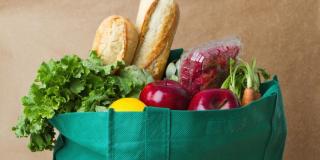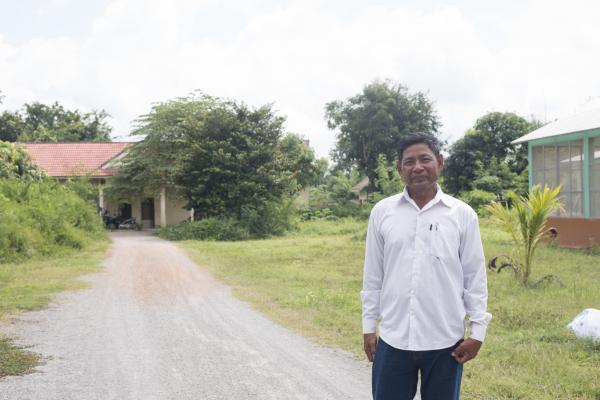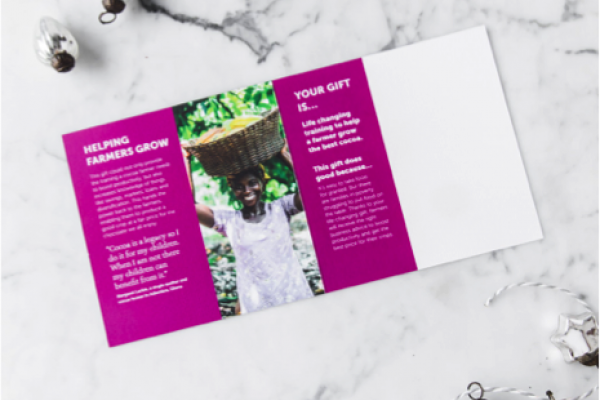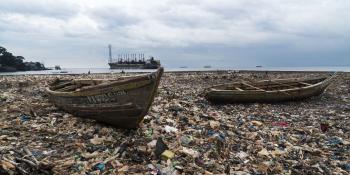
Fairer wages, sustainable business practices, fewer items going to landfill… These are just a few of the benefits of switching up your shopping habits.

In Cambodia, Prak Sim is a rural farmer who, thanks to training from VSO volunteers, is now growing produce in a profitable – and sustainable – way.
Volunteers here have trained farmers in growing crops that are resistant to climate change, and showed them how to access markets that will give them a better price for his produce.
Prak is using the extra income to send his children to school, and to buy food for his family.
As a producer, Prak is at one end of the supply chain. On the other end of the chain is the consumer – it could be you.
Making more ethical choices as you shop could make the world of difference to people on the other side of the world.
Read on to find out our best tips and tricks for shopping more ethically:
1. Less is more
This is a simple one. Don’t buy things you don’t need.
Every year, a third of all food is wasted globally. While much of this goes to waste before it reaches the consumer, many households waste food needlessly. You can tackle this food waste and save some money by making a list before you go shopping, and looking at what food typically goes in the bin in your home.
If you want to tackle food waste head on, you could try downloading an app like ‘Olio’ or ‘Too Good To Go’, where you can rescue food that would otherwise go to waste!
2. Shop pre-loved
Give clothes and bric-a-brac a second life by visiting charity shops. Your money will do some good for the charity, you’ll probably save some money, and you’ll be breaking the cycle of fast fashion.
When it comes to furniture, Facebook Marketplace and Gumtree are great places to find cheap furniture that doesn’t cost the Earth.
3. Support the companies doing good…
…And avoid the ones that aren’t. Doing your research behind brands you know and love can be enlightening.
Check their website for more info: can they prove their ethical credentials through their actions? How is the brand rated by other websites like Ethical Consumer, which compares different brands and products? By thinking more about the brands you buy, you can support the causes that are important to you.
4. Look at the label
Where do your purchases come from? Fruit, veg, clothes and an array of other products will state on the label the country of origin. Generally, fewer air miles = better for the planet.
Buying locally from independent shops also has the advantage of boosting the local economy.
Keep an eye out for logos on the label, such as the Fairtrade logo, which shows that people are being paid fairly for their work, or the Rainforest Alliance logo, that confirms a product meets certain environmental, social and economic sustainability standards.

5. Give back with your gift giving
When it comes to Christmas and birthdays, opt for presents that you know the other person will love or make use of. If you’re feeling crafty, handmade and edible gifts can go down a treat.
Or, why not give a gift that will do some good in the world? From a disaster relief kit for a family of four, to training for teachers to help them prevent the forced early marriage of girls, purchasing one of VSO’s Gifts for Good makes a big difference to communities in Africa and Asia, and might be the ideal gift for the person who has everything!
What will you do?
We can all take steps towards making better choices.
Why not choose one thing you want to change about your shopping habits, and try it out over the next month?
Read more

The homes built on plastic: Life in a Sierra Leone slum
In Freetown, Sierra Leone, tens of thousands of people live with a sea of plastic waste on their doorstep. They're suffering disease, death and indignity. One volunteer is determined to make a stand on behalf of his community.
How we're prepping the world's poorest for climate change
People in developing countries are bearing the brunt of global climate change, but VSO is supporting communities to become more resilient to changes in their natural environment.
